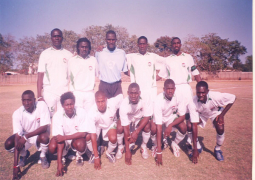As the dry season is fast approaching, Totokulung bana kafo, a traditional communicator group, at the weekend held a day sensitization campaign on the dangers of bushfires.
The campaign took the form of match pass across the Brikamaba lumo led by traditional drumming, singing and chanting “NO BUSH FIRE”, demonstrating the negative impact of bush fires.
Mr Lamin Keita, alias as Taka Titty, a traditional communicator and the director of Totokulung bana kafo, has warned the people of the region to exercise extra caution to prevent bushfires.
Mr Keita made these remarks in an interview with this reporter in Brikamaba Central River Region south.
Mr Keita opined that the peak seasons for bushfires are from November to December, when farmers are busy with harvesting, and May to June, when the dominant farming activity is phasing out.
Mr Keita disclosed that most bush fire incidents occur outside the community forest and forest parks, adding that bushfires do not only affect agriculture but also contribute to environmental degradation.
Some community forests and forest parks are being successfully managed, he said, noting that their protection from annual bushfires has brought some improvement in bio-diversity.
To him, forests serve as bank for people who value it, and that plans were in the offing to ensure that resources are conserved for their availability for generations yet unborn.
Noting that there is an embargo on the issuance of forest licences and usage of chain saws in the country, he said anybody found culpable would face the full force of the law.
Keita called on all the local communities to be watchdogs and strengthen their efforts to protect the forest by developing fire prevention strategies such as creating fire belts along constituency and village boundaries.
This is a collective responsibility and that the youths should take charge of their responsibilities, he said, while calling on the people of the region to utilize the resources in a more sustainable manner.
He said communities should be more pro-active in protecting the forests and its resources.
He stressed the need to protect the forest from indiscriminate illegal activities in order to preserve and conserve the remaining natural resources.
He also urged all and sundry to serve as police officers in tracking down offenders by reporting any suspect to a nearby police station, saying people embarking on tree felling and causing bush fires are hosted by our own Gambians, who aid them in their operations.
There are structures in place and that they are working in close collaboration with community foresters and other stakeholders, he noted, urging the line department and stakeholders to work hand in glove in the prevention and protection of forests from indiscriminate extraction of wood and non-wood products.
“The expansion of agricultural activities has changed the forest structure,” he noted.
Keita also said his organization has been embarking on series of sensitization with the local community to minimize bush fires, adding that plans are underway to do more public awareness creation on the importance of environmental protection, the benefits derived from the forest and the impacts of bush fires in the forest.
He also highlighted some of the negative impacts of bush fires, saying: “It causes low agricultural productivity, exposure of the land, loss of nutrients to the land and other purposes of which are very important to human life.”



